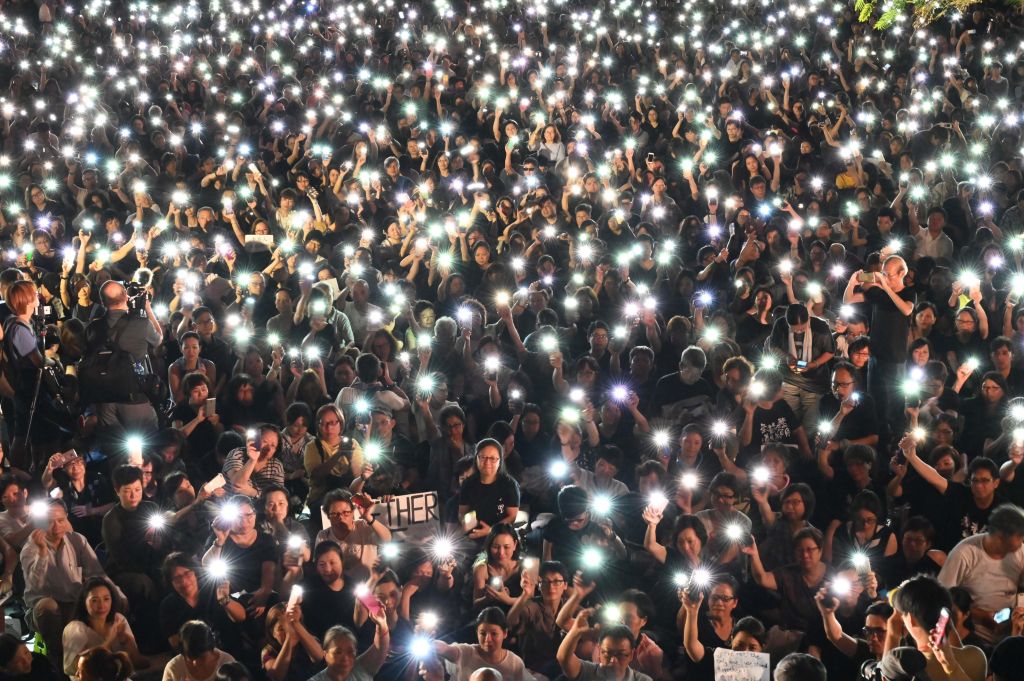If you believe the American and British media, the people of Hong Kong have launched a democratic revolution and are being cruelly repressed. None of this is true, but let’s not let that get in the way of our principles.
Western liberals assume that disorder is revolutionary and democratic, and that it tends towards liberal and egalitarian outcomes. These touching assumptions reflect the fading memory of twentieth-century American and British politics, and not the plentiful evidence that democratic revolutions usually tend towards tyranny — which is what happened in Russia in 1917, in Germany shortly afterwards, in Egypt more recently, and, pertinently, in China after 1949.
Western liberals also assume that a liberal and egalitarian Hong Kong would be in our interest. They may well be right about this, but there is more wish than fact in their hope that the young people of Hong Kong will secure an interest that Western governments had failed to secure, despite their greater leverage.
American media are ignorantly idealistic about Hong Kong, the British cynically so. It’s not often I find myself in agreement with the spokesmen of China’s foreign ministry, but they’re right to complain about British politicians ‘gesticulating’ and sticking their noses into China’s sovereign business.
The British didn’t bother to democratize Hong Kong when China was weak, and they didn’t dare democratize Hong Kong as China grew stronger. As 1997 approached, the British didn’t even offer passports to their Chinese subjects, the people whose hard work and ingenuity have made Hong Kong what it is.
Instead, the British left a late colonial-style Legislative Council, with the rule of law, but not the rule of the people: an unrepresentative assembly with a free judiciary. The die was cast. Who believed that Hong Kong, whose own system had not been fully liberalized before 1997, would liberalize the People’s Republic after 1997? Only Western liberals, who were reaching peak triumphalism at the end of the Nineties.
Who expected Hong Kong to be absorbed into China over the agreed 50-year period? The Hong Kongers. But, as usual, nobody asked them. The Hong Kongers have gone from being bossed by the Brits to being bossed by Beijing — and each time because it was historically and politically logical.
Given that the British failed to fully liberalize Hong Kong’s domestic politics, and given that Hong Kongers are a distinct people, you might think the Hong Kongers would appreciate having a extradition treaty with China — a recognition that China and Hong Kong remain, legally speaking, ‘two systems’. Everyone else has extradition treaties, apart from a handful of territories which are sanctuaries for criminals.
Grenville Cross, Hong Kong’s ex-public prosecutor, told CNN that Hong Kong, ‘Asia’s world city’, is becoming ‘China’s criminal sanctuary’. More than 300 criminal suspects have fled to Hong Kong from the mainland. So have people convicted of money-laundering and bribery in nearby Macau, and at least one alleged murderer from Taiwan.
The presence of these convicts and suspects undermines the rule of law that was Hong Kong’s pride, and an immeasurable economic asset. China, according to Cross, has sent nearly 250 suspects to Hong Kong, but Hong Kongers are now holding mass demonstrations against an extradition treaty with China — and in the name of a rule of law that the protesters themselves are attacking.
The protesters fear that the treaty is the thickening middle of a wedge of judicial and political interference by Beijing. But as Grenville Cross pointed out to a visibly irritated CNN anchor, the extradition treaty would not lead to automatic extradition. Each case would be given a full hearing, and the Hong Kong court would not surrender a fugitive from political persecution.
The protesters’ claim that their rights are being abrogated, a claim amplified by Western media, doesn’t stand up. And though the protesters claim that pressure from Beijing drove the hurried attempt to pass the extradition treaty in the Legislative Council, Chief Executive Carrie Lam has admitted that it was her misjudgment.
Yonden Lhatoo of the South China Morning Post blames the government as well as the protesters. The protesters have shocked Hong Kong’s ‘lame-duck government out of its arrogance and complacency’, but also calls it ‘outrageous’ that ‘some of our younger citizens are upending the rule of law’ with ‘complete impunity’. The scale and violence of the protests suggest that something else is going on, and that this is about more than a mistimed move for an extradition treaty.
People who want to protect their rights from outside interference don’t smash up their own legislature or throw corrosive materials at the police. These are the self-harming pleasures of revenge and frustration. Hong Kong has lost its financial eminence to Shanghai. The Beijing government has released plans to regionally integrate, or regionally subordinate, Hong Kong into the industrial hinterland of Guangzhou province.
The future is not just the merging of Hong Kong with China when the 50 years of the Sino-British treaty run out in 2047. It is one of diminished horizons and possibilities. Hong Kong cannot survive without the mainland — even its drinking water and electricity are piped across the bay — but the mainland does not need Hong Kong to survive in its distinctive form as anything more than a shop window, to tempt Taiwan into a similar arrangement. And it’s not clear if Hong Kongers can invent a new economic identity, as they did in the decades after 1949. It is clear, though, that the protests are a public demonstration of the weakness of liberal systems — an inverse endorsement of Beijing’s attitude to democracy.
You can see from the news footage that the young protesters have learnt the Western way of protest, and how to play it for the cameras. Have they also learnt the Western habit of dissatisfaction that Tocqueville called the ‘revolution of rising expectations’?
The protesters are not only demanding universal suffrage and democracy. They are angry at losing the benefits historically associated with liberal democracy: economic opportunities, good jobs, affordable housing, and ever-growing affluence. Ironically, previous generations of Hong Kongers had those benefits without universal suffrage or democracy. Meanwhile, the linkage between liberal democracy and economic growth is fraying in the West — which is why people in the developed Western economies are taking to the streets with similar demands.
In their present frustration and their anxiety about the future, the Hong Kong protesters have much in common with the gilets jaunes in France and the Five Star Movement in Italy, but instead of demanding economic illiberalism in the name of democracy, they’re demanding democracy as the symbol of economic liberalism. So East is East, the Western media are the Western media, and never the twain shall meet, except at the G20.
Dominic Green is Life & Arts Editor of Spectator USA.


















